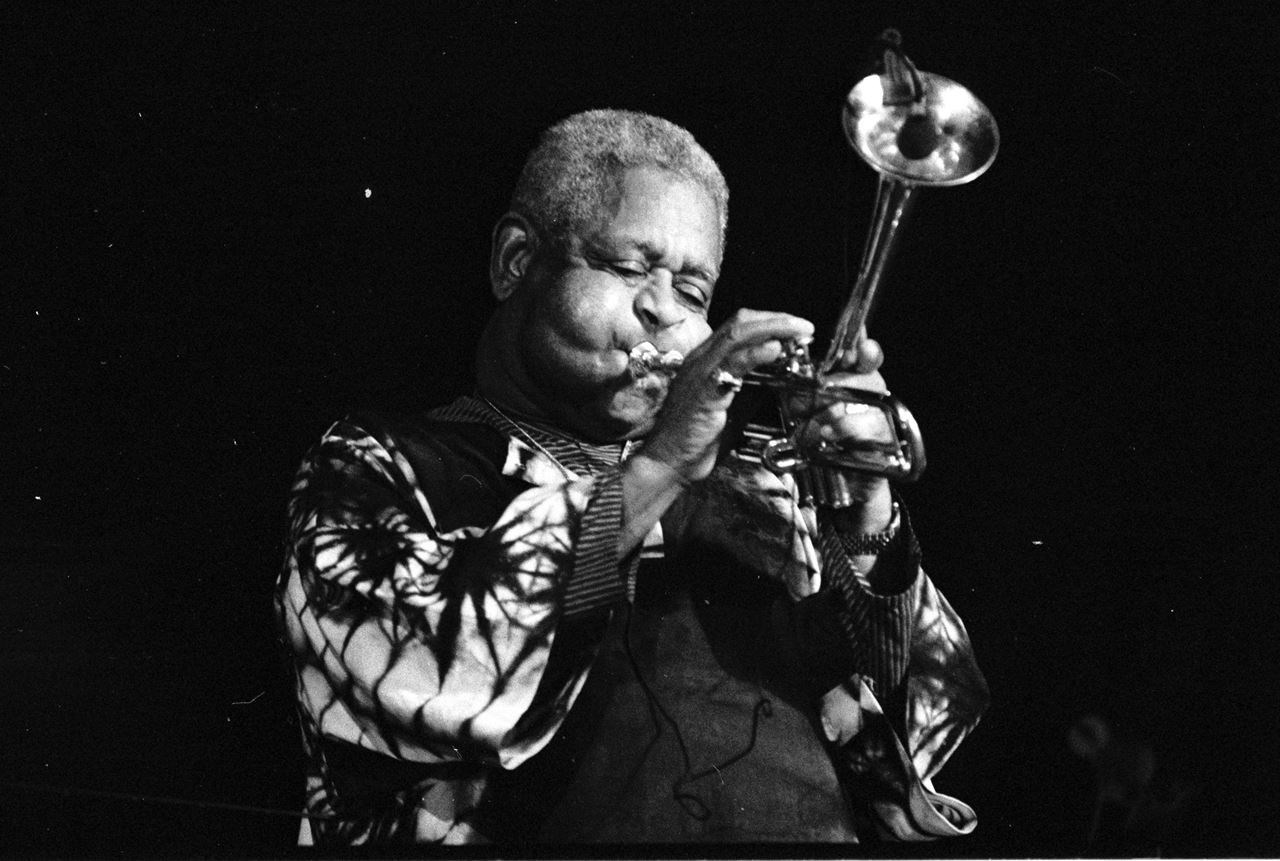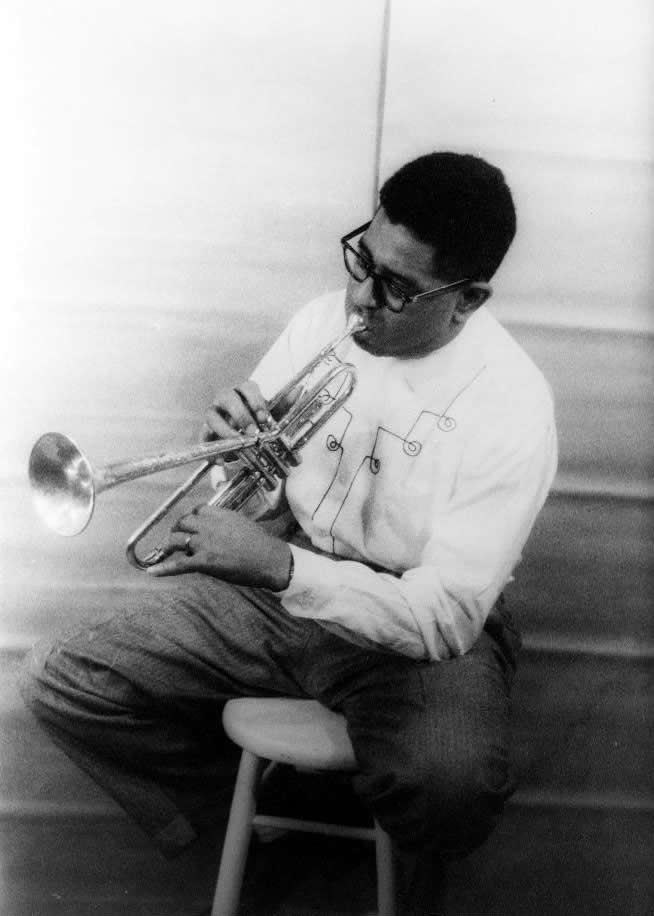 Dizzy GillespieRoland Godefroy [CC BY 3.0] via WikimediaBorn in 1987, in Cheraw, SC, Gillespie became a musician in the third grade. He began playing the trombone, shortly before switching to trumpet, the instrument he is most known for. He joined his first professional orchestra at 19 years old and soon went on to play and perform jazz, a genre and culture he would help define and shape. He had a desire to improve the culture he loved and wouldn't stop until he succeeded. Dizzy Gillespie is not only a hero because of his inspiring talent as a musician, but his work in progressing the music industry into the massive profession it is today and his extremely high moral values.
Dizzy GillespieRoland Godefroy [CC BY 3.0] via WikimediaBorn in 1987, in Cheraw, SC, Gillespie became a musician in the third grade. He began playing the trombone, shortly before switching to trumpet, the instrument he is most known for. He joined his first professional orchestra at 19 years old and soon went on to play and perform jazz, a genre and culture he would help define and shape. He had a desire to improve the culture he loved and wouldn't stop until he succeeded. Dizzy Gillespie is not only a hero because of his inspiring talent as a musician, but his work in progressing the music industry into the massive profession it is today and his extremely high moral values.
Dizzy Gillespie inspires so many musicians today because of his amazing skill as a trumpet player. In the article "Dizzy Gillespie", the author, Barry Kernfeld, says:"From mid-1927, when Gillespie's father died, the family lived in poverty. Gillespie studied trombone in the third grade but began to double on trumpet, borrowing a friend's instrument. He became Cheraw's best musician, playing trumpet or cornet. A long-standing feature of Gillespie's playing was evident even then, as a teenage companion, trombonist Norman Powe, recalled: "It was a very fast style. He didn't have a tone. He doesn't have a good tone now, but his execution outweighs all that" (Kernfeld). Even from a young age, Dizzy was an excellent musician, surpassing all his friends and even his teacher. That made him the best musician in his town, which is still impressive even though it was a small town. Later, when the new jazz movement was coming to being: "Though Gillespie's technical expertise and soaring harmonies on the trumpet made him an integral part of this new movement" (Dizzy Gillespie). Dizzy Gillespie's ability as both a trumpet player and a musician made him a great leader. His unique style made him an important leader in the movement that was coming to be. Gillespie's musical talents made him a great band leader and a great musician, which helped him get to the top and stay there.
In addition to his musical abilities, Gillespie also worked very hard to help the music industry as a whole, grow and reach new heights. Gillespie created a whole new style that: "[...] gave jazz a deeper and more complex dimension, and [Charlie Parker]'s and Gillespie's innovations continue to influence the development of jazz. Though jazz is perhaps the most intrinsically American of all music forms, it is a combination of many influences"(Dizzy Gillespie). Gillespie's new style continues to help jazz grow as a whole. It also helped define jazz and american music, which had different components from other places. Gillespie also helped so much he was: "[...] the most influential jazz trumpeter after Louis Armstrong, the most significant figure in bebop after Charlie Parker, the driving force behind the most successful early efforts to incorporate Latin music into jazz, and-despite his comic excesses-a pivotal figure in the transformation of jazz from dance music to concert music."(Kernfeld). Dizzy Gillespie wasn't the first to do many things, but he was one of the best to do these. He was also a lot more successful than a lot of others that tried the same thing. Gillespie's innovation helped jazz grow as a whole and landed him a spot in the jazz hall of fame to be remembered today.
 Dizzy GillespieCarl Van Vechten [Public domain] via WikimediaDizzy Gillespie was named an ambassador to other countries sent to talk on behalf of the US government but: "Instead, he got to know individuals, played free concerts for children and the poor, and brought back rhythms such as the samba and bossa nova to enrich American musical culture" (Dizzy Gillespie). Instead of trying to paint his government in as good light as possible, he instead tried to spread love and kindness through music. Even when he was out helping people, he was still looking for ways to enrich Jazz culture. However, his efforts did not go unrecognized: "By 1990 Gillespie had won recognition of all kinds, including a plaque presented to him by President Dwight D. Eisenhower in 1956. In 1989 he was named a Nigerian tribal chieftain. The next year he received the National Medal of Arts, he was made a French Commandeur des Arts et Lettres, and he was awarded the Kennedy Center Honor" (Kernfeld). Others saw his efforts and recognized him for it. He had done so much he was rewarded by a lot of different for a lot of different reasons. Dizzy Gillespie had the most important quality of a hero, which is a desire to help others.
Dizzy GillespieCarl Van Vechten [Public domain] via WikimediaDizzy Gillespie was named an ambassador to other countries sent to talk on behalf of the US government but: "Instead, he got to know individuals, played free concerts for children and the poor, and brought back rhythms such as the samba and bossa nova to enrich American musical culture" (Dizzy Gillespie). Instead of trying to paint his government in as good light as possible, he instead tried to spread love and kindness through music. Even when he was out helping people, he was still looking for ways to enrich Jazz culture. However, his efforts did not go unrecognized: "By 1990 Gillespie had won recognition of all kinds, including a plaque presented to him by President Dwight D. Eisenhower in 1956. In 1989 he was named a Nigerian tribal chieftain. The next year he received the National Medal of Arts, he was made a French Commandeur des Arts et Lettres, and he was awarded the Kennedy Center Honor" (Kernfeld). Others saw his efforts and recognized him for it. He had done so much he was rewarded by a lot of different for a lot of different reasons. Dizzy Gillespie had the most important quality of a hero, which is a desire to help others.
Dizzy Gillespie was a hero because of his skill as a musician and a trumpet player that inspires us today, as well as an integral part of forwarding the music industry, and his strength of character or willingness to do the right thing. He traveled to many places to spread his music and message, and was rewarded for it even though he never asked. He became a great musician at a young age, inspiring others today to follow in his footsteps. He also furthered the music industry and without him and a couple of others, we wouldn't have the music we have today. He worked with many others to make and improve music of the time, and he tried to make the world a better place in any way possible, even trying to run for president at one point. He was so dedicated, others looked up to him and bestowed awards upon him in recognition for all he had done. Dizzy Gillespie is an inspiration to me, as he should be to everyone else for his hard work, musical talents, and his humanitarian efforts.
Page created on 2/11/2016 12:00:00 AM
Last edited 8/23/2024 3:35:40 PM
Dizzy Gillespie." St. James Encyclopedia of Popular Culture. Detroit: Gale, 2013. Biography in Context. Web. 4 Feb. 2016.
Kernfeld, Barry. "Dizzy Gillespie." American National Biography (2010): 1. Biography Reference Center. Web. 3 Feb. 2016.
